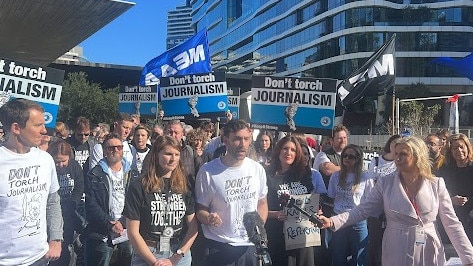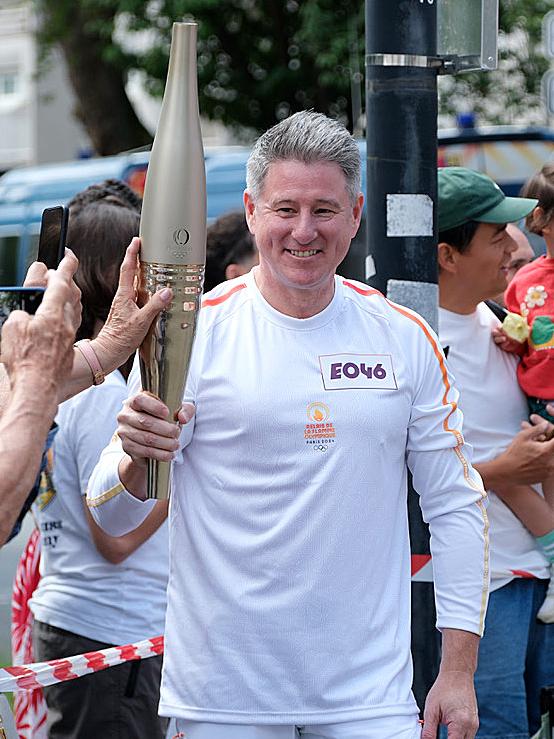Selfish, entitled Nine newspaper strikers show utter disregard for their readers
The decision by Nine’s publishing division to go on strike during the first five days of the Paris Olympics is one of the most egregious acts of industrial self-sabotage since the turn of the century.
The decision by Nine’s publishing division to go on strike during the first five days of the Paris Olympics is one of the most egregious acts of industrial self-sabotage since the turn of the century.
The move reeks of entitlement, selfishness and an utter disregard for the people who are the only reason they have jobs — their readers.
In fact, since hundreds of Nine’s journalists from across The Age, The Sydney Morning Herald, The Australian Financial Review, WAtoday and The Brisbane Times downed tools and walked off the job at 11am on Friday, it’s been instructive to observe how little mention there has been of the hardworking folks who buy Nine’s newspapers or take out digital subscriptions.
You know, the precious band of Australians who are actually willing to pay money for properly researched work produced by professional journalists?
Do the striking journos really think their readers — not to mention their advertisers — will remain loyal after they crippled their coverage of the Olympics?
Unlikely.

As an advertiser, why would you hitch your wagon to a mob willing to hold the business to ransom at the time when the readers need them the most?
Think elections, natural disasters, grand finals, Olympics.
To cut and run at such a time shows a complete unwillingness to negotiate with management in good faith.
Yes, the strike has achieved maximum impact, but at what cost?
And what about the 15-20 members of Nine’s publishing division who were selected to travel to France to cover the Games?
For many, it was to be the assignment of a lifetime, but is now forever tarnished, with the journos forced to sit on their hands for five days and watch while other journalists from all over the world throw themselves into the challenge of working on the only truly global event on the planet.
Where’s the comraderie in that?
Would it really have made that much difference if the industrial action had been taken after the Games?

The initial claim from members of the Media Entertainment & Arts Alliance was ludicrous: a 20 per cent pay rise over three years.
The MEAA had the gall to say last week “journalists are asking for a modest pay rise in-line with CPI; nothing more and nothing less.”
With CPI running at about 3-4 per cent, the MEAA’s claim is as hollow as some of the newsrooms it purports to defend.
Nine management countered with an offer which, in the current economic environment, would seem reasonable to most Australians — close to a 10.5 per cent pay increase over three years.
Not the biggest pay bump, but a better deal than a great many other Australian workers can expect in the next few years.
The offer was overwhelmingly rejected by staff.
The harsh truth is the news media business in Australia, and indeed the world, is at a crossroads.
Staff at Nine’s Melbourne headquarters protesting over a pay dispute while holding Olympic torches and criticising CEO Mike Sneesby who ran with the torch in France this week, @australian. pic.twitter.com/gtIvVcgEkD
— Sophie Elsworth (@sophieelsworth) July 26, 2024
The current “slump” in advertising revenue is so severe many media executives are saying privately that it’s hard to see the ad market ever returning to full health.
Journalists know how tough things have been for the industry.
They only need to look across at the empty desks left vacant by colleagues who have lost their jobs in the downturn.
Furthermore, staff at Nine’s publishing division are bracing for the loss of 90 more colleagues under a round of redundancies announced in June.
To be clear, the right of workers to join a union, and to take protected industrial action, is something to cherish in a democracy.
But, to see a large group of journalists — most of whom are wired to chase stories as hard as they can, no matter the conditions — turn their backs on the biggest global event of the year is a crying shame. Everyone loses.
And lest there be any criticism a News Corp publication is taking an opportunistic swing at a commercial rival’s decision to strike, it should be pointed out many Nine staff contacted by The Australian over the past 48 hours have expressed deep dismay at how the industrial action has been handled but, for obvious reasons, do not want to speak out publicly.
It’s not just a dark few days for Nine; it’s a dark period for the industry as a whole.
At this stage, striking staff at Nine won’t return to work until Wednesday morning, by which time, the high point of the Olympic Games for many Australians — the swimming competition — will already be half-finished.
It remains to be seen how many supporters of Nine’s journalism will return with them.






To join the conversation, please log in. Don't have an account? Register
Join the conversation, you are commenting as Logout